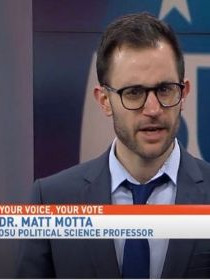
Matthew Motta
Connect with Matthew
About Matthew
Motta's research focuses on a wide range of topics related to American politics, public opinion, science communication, and both health and environmental policy. Motta is especially interested in identifying the social and political determinants of anti-science attitudes, and investigating their policy impact. He is also broadly interested in designing communication strategies that promote effective engagement between the public and the scientific community on politically contentious issues.
Contributions
How Interest in Science Boosts Trust in Climate Scientists
No Jargon Podcast
In the News
Publications
Uses American National Election Study and General Social Survey data to examine how question wording shapes responses given about rights for marginalized groups. Focuses on using gay/lesbian versus homosexual and finds that the latter results in less support for gay and lesbian rights.
Finds that anti-intellectualism is associated with not only the rejection of policy-relevant matters of scientific consensus but support for political movements (e.g. "Brexit") and politicians (e.g. George Wallace and Donald Trump) who are skeptical of experts. Shows that these effects can be mitigated. Discusses how scholars might build on this research to study the political consequences of anti-intellectualism in the future.
Finds that political engagement and demographic factors but not actual measurements of cognitive ability are associated with interviewer intelligence rating scores. Suggests that interviewer ratings are better understood as proxies for political engagement, not cognitive ability. Argues that the growing importance of studying cognitive ability in political science makes it necessary to include more objective verbal intelligence tests more frequently in public opinion surveys.
Considers how March for Science rallies that took place across the United States in late April 2017 influenced Americans' attitudes toward scientists and the research they produce. Shows that the March appears to have had little effect on the public's attitudes about scientific research. Calls attention to the possibility that the political actions of scientists can shape public opinion about them.
Shows that "gay" and "homosexual" are far from being synonyms and have consequences for attitudes about gay and lesbian rights. Provides a historical overview of the terms "homosexual" and "gay and lesbian," showing the different connotations that social groups have come to associate with these terms. Shows that group identity and authoritarianism shape attitudes toward "homosexual" rights differently than "gay and lesbian" rights.
Finds that interest in science at age 12-14 years is associated with increased trust in climate scientists in adulthood (mid thirties), irrespective of Americans' political ideology.